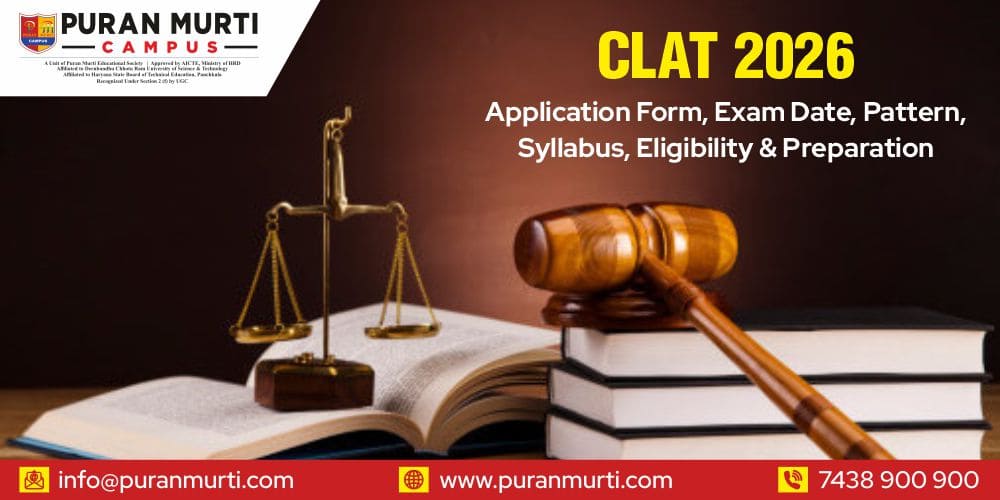CLAT 2026-Application Form
Posted on : 25 September, 2025 2:29 pm
CLAT is an acronym for Common Law Admission Test. CLAT is a national-level entrance exam in India administered by the Consortium of National Law Universities (NLUs). Candidates apply for admission to undergraduate (UG) and postgraduate (PG) law courses at participating NLUs through CLAT. Here is the CLAT 2026-Application Form.
CLAT 2026 — Key Dates & Timeline
The following is the schedule as declared (or tentatively anticipated) for CLAT 2026:
| Event | Date / Period |
|---|---|
| Start of online registration / application | 1 August 2025 |
| Last date to apply | 31 October 2025 |
| Admit card release | November 2025 (expected) |
| Exam date | 7 December 2025, 2:00 PM – 4:00 PM (offline) |
| Provisional answer key / objections | December 2025 (to be notified) |
| Result declaration | December 2025 / early 2026 (tentative) |
| Counselling / seat allocation | Late December 2025 / early 2026 (tentative) |
Note: These dates are subject to the official notification and media release. Always cross-check with the official Consortium of NLUs website for any update or changes. APPLY NOW
Eligibility Norms of CLAT 2026
The candidate is supposed to fulfill certain eligibility requirements to appear for CLAT 2026. They vary a little for UG (5-year integrated law) and PG (LLM) courses. APPLY NOW
| Parameter | CLAT UG (5‑year integrated) | CLAT PG (LLM) |
|---|---|---|
| Educational Qualification | Passed 10+2 or equivalent from a recognized board. | Should hold an LL.B. degree (3-year or 5-year) or equivalent. |
| Minimum Marks | General / OBC / Others: 45%; SC / ST / PwD: 40% | General / OBC: 50%; SC / ST / PwD: 45% |
| Age Limit | No upper age limit. | No upper age limit mentioned |
| Attempts | Unlimited (provided eligibility is satisfied) | Generally, no limit on number of attempts. |
| Additional Notes | Students appearing in the qualifying exam (10+2) may also be allowed to apply (subject to conditions). | Some universities may have additional eligibility norms — always check the specific NLU’s notification. (E.g. minimum LL.B. marks criteria) |
Application Form / Registration — How to Apply
Here’s a step-by-step guide to filling the CLAT 2026 application:
- Visit the official website
The application is done via the Consortium of NLUs portal. - Registration / Sign up
Give basic information (name, email, mobile, etc.) to generate credentials. - Login and submit application form
Choose if you are filling the form for UG or PG, enter personal details, academic records, etc. - Upload Documents
Common documents required:
- Passport size photo (in specified format & size)
- Signature
- Caste / category certificate (if applying under SC/ST/OBC)
- PwD certificate (if applicable)
- Other required certificates (e.g. BPL, if seeking fee concession)
- Select Exam Centre Options
- You might be required to select 2–3 desired exam centre. APPLY NOW
5. Pay Application Fee
You pay the fee online through credit card, debit card, net banking, etc. after filling the form.
| Category | Fee |
|---|---|
| General / OBC / PWD / NRI etc. | ₹4,000 |
| SC / ST / BPL | ₹3,500 |
| Extra fee for past year papers (if selected) | ₹500 (optional) |
- Application Correction Window:
Normally, a brief window is available after submission in which you can edit some fields (such as exam centre, name, etc.). - Print Confirmation / Acknowledgement:
After payment and submission, print out / save a PDF copy of your application confirmation for reference. APPLY NOW
Important Pointers & Tips:
-
Carefully verify all data (name, DOB, exam centre, category) is correct; errors might not be editable all the time.
-
Use good quality scanned images for photos / signatures within specified size constraints.
-
Make sure to retain copies of every document you send.
-
Keep watching the official site for any changes and updates. APPLY NOW
Exam Pattern & Structure
The exam pattern of CLAT recently got changed, and the 2026 exam will be held under the new pattern.
CLAT UG (5-year Integrated Law) — Pattern APPLY NOW
| Parameter | Details |
|---|---|
| Mode | Offline (pen-and-paper) |
| Duration | 2 hours (120 minutes) |
| Number of Questions | 120 MCQs |
| Total Marks | 120 marks |
| Marking Scheme | +1 mark for correct answer, –0.25 mark for incorrect answer (i.e. negative marking) |
| Sections / Subjects | 5 sections: • English Language • Current Affairs & General Knowledge • Legal Reasoning • Logical Reasoning • Quantitative Techniques |
| Passage-Based Questions | Most questions will be based on passages. |
CLAT PG (LLM) — Pattern APPLY NOW
| Parameter | Details |
|---|---|
| Mode | Offline (pen-and-paper) |
| Duration | 2 hours |
| Number of Questions | 120 MCQs |
| Total Marks | 120 marks |
| Marking Scheme | +1 for correct, –0.25 for wrong |
| Subjects / Syllabus | Covering topics like Constitutional Law, Jurisprudence, Contracts, Criminal Law, Torts, International Law, Intellectual Property Rights, etc. |
Full Syllabus / Subject-wise Topics
Here is the general syllabus pattern for CLAT(common law admission test) 2026.
Note: There may be slight modifications in the official syllabus, so always check the Consortium’s notification.
UG Level Syllabus
-
English Language
-
Reading comprehension (passages)
-
Vocabulary (synonyms, antonyms, context-based usage)
-
Grammar / usage (few questions)
-
Verbal ability APPLY NOW
-
-
Current Affairs & General Knowledge
-
National & International events
-
Awards, sports, economics
-
Legal news / landmark judgments
-
Books, authors, summits, etc. APPLY NOW
-
-
Legal Reasoning
-
Legal propositions / principles
-
Application of legal rules to new facts / scenarios
-
Analogies in law
-
Identifying issues / cause & effect APPLY NOW
-
-
Logical Reasoning
-
Deductive reasoning
-
Critical reasoning
-
Series, patterns
-
Logical puzzles / arrangements
-
Syllogisms, arguments APPLY NOW
-
-
Quantitative Techniques (Math)
-
Elementary arithmetic (percentages, ratios, averages)
-
Algebraic manipulations
-
Number systems, basic probability
-
Data interpretation (tables, charts) APPLY NOW
-
PG Level Syllabus (LLM)
The syllabus is more technical and law‑based. Some of the important topics are: APPLY NOW
-
Constitutional Law
-
Jurisprudence / Legal Theory
-
Contracts
-
Torts
-
Criminal Law
-
International Law
-
Intellectual Property Rights (IPR)
-
Administrative Law
-
Arbitration & Alternative Dispute Resolution
-
Environmental Law
-
Other law subjects (as per participating NLUs) APPLY NOW
Top Government Law Universities in India APPLY NOW
- Faculty of Law, University of Delhi (DU)
- Jamia Millia Islamia (JMI)
- National Law Universities (NLUs)
- Amity Law School, Noida
- O.P. Jindal Global University (JGU)
- Puran Murti College of Law
In addition to NLUs and government colleges, Puran Murti College of Law is a great option for those seeking quality legal education with state-of-the-art facilities.
About the College
-
Sonipat, Haryana
-
Approved by Bar Council of India (BCI)
-
Practical legal training, research-based learning, and industry interaction are known offerings. APPLY NOW
Law Courses Offered
-
BBA LL.B (5-year integrated)
Facilities & Highlights
-
Moot court practice for actual advocacy skills.
-
An electronic library with law journals, e-books, and case studies.
-
Active seminars, workshops, and guest lectures by legal experts.
-
Great placement assistance in corporate law firms and law chambers
-
Reasonable fees emphasizing all-round development. APPLY NOW
Preparation Strategy & Tips
Cracking CLAT needs smart strategy as well as disciplined action. Here below is a systematic approach:
1. Understand the Exam Thoroughly
-
Scan through official notification, exam pattern, and syllabus.
-
Practice previous years’ papers to get a feel of questions.
-
Know where you are weak and where you are good. APPLY NOW
2. Prepare a Study Plan & Timetable
-
Devote time to each area (English, logical, legal reasoning, quant, GK).
-
Set regular time slots for Current Affairs / GK updations daily.
-
Construct revision loops—don’t allow topics forget get stale. APPLY NOW
3. Establish Strong Foundations
-
For English: Enhance reading speed, vocabulary, comprehension abilities.
-
For Logical/Analytical: Practice puzzles, critical thinking, series, etc.
-
For Legal Reasoning: Read the fundamental concepts of law, benchmark judgements (for UG) and law books (for PG).
-
For Quant.: Brush up the basics-practice basic arithmetic, algebra, and data interpretation. APPLY NOW
4. Practice & Mock Tests
-
Take timed, full-length mock tests at least once a week.
-
Practice with simulated exams (no distractions, tight time-management).
-
Post every mock, look back into your errors: which questions did you answer incorrectly, why, and how can one avoid making those mistakes.
-
Time management (number of minutes per section) should also be practiced. APPLY NOW
5. Current Affairs & GK
-
Read dailies (e.g. The Hindu, Indian Express) and weeklies or magazines on a daily basis.
-
Prepare brief notes of significant events, names, dates.
-
Revisit GK at regular intervals (weekly, monthly).
-
Pay particular attention to legal current affairs: Supreme Court decisions, milestone cases, law reforms, legal news.
6. Revision & Short Notes
-
Keep brief notes / flashcards for vocabulary, concepts, formulas, legal jargon.
-
In the final 1–2 months, concentrate more on revision and mocks.
-
Do not begin new concepts close to the exam. APPLY NOW
7. Speed + Accuracy
-
Both speed and accuracy are important in CLAT (due to negative marking).
-
Practice quick elimination of incorrect options.
-
Don’t be stuck; skip and come back later if time permits. APPLY NOW
8. Psychological Preparation & Exam Day Strategy
-
Develop stamina by attempting long mock sessions.
-
student Keep calm and do not panic during exam.
-
Read the all instructions carefully, plan time per section.
-
Try simpler questions first, and then attempt harder ones. APPLY NOW
9. Use Quality Study Material & Resources
-
Old years’ CLAT papers
-
Standard books on logical reasoning, quant, legal reasoning
-
Mock test series from well-known coaching / online sources
-
Online websites, video lectures for complex subjects
-
Join discussion forums or study groups to get doubts cleared APPLY NOW
Sample 6‑Month Preparation Roadmap (for UG candidate)
| Months | Focus Areas | Suggested Activities |
|---|---|---|
| Month 1–2 | Establishing foundation | Cover fundamentals: English language & vocabulary, fundamental quant topics, legal reasoning concepts, read daily GK, practice short LR questions |
| Month 3–4 | Middle-level practice | Add questions by topic, include sectional tests, additional mocks, work on weak spots, law news updates |
| Month 5 | Full mocks & revision | Attempt full-length mocks, review incorrect questions, time-bound practice, clarify exam strategy |
| Month 6 | Last polish & consolidation | Mock on a daily basis, revision of short notes, last-minute GK & legal news, physical & mental preparation for exam day APPLY NOW |



